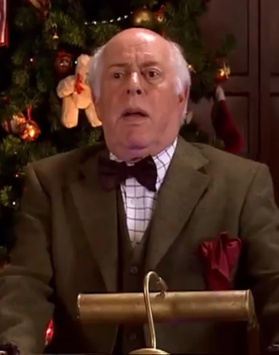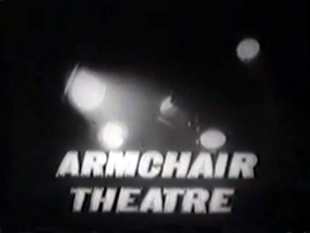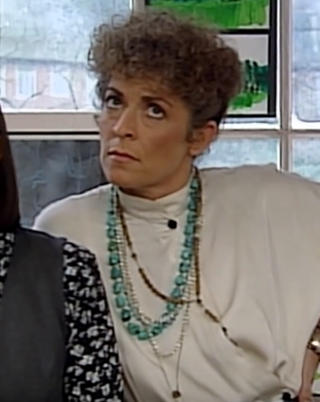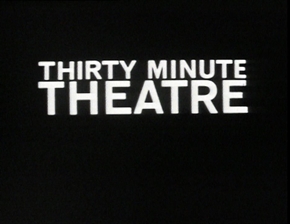Related Research Articles

Up Pompeii! is a British television comedy series set in ancient Pompeii and broadcast between 1969 and 1970, starring Frankie Howerd. The first series was written by Talbot Rothwell, a scriptwriter for the Carry On films, and the second series by Rothwell and Sid Colin. Two later specials were transmitted in 1975 and 1991 and a film adaptation was released in 1971.

Quatermass and the Pit is a British television science-fiction serial transmitted live by BBC Television in December 1958 and January 1959. It was the third and last of the BBC's Quatermass serials, although the chief character, Professor Bernard Quatermass, reappeared in a 1979 ITV production called Quatermass. Like its predecessors, Quatermass and the Pit was written by Nigel Kneale.

Doomwatch is a British science fiction television programme produced by the BBC, which ran on BBC1 between 1970 and 1972. The series was set in the then present day, and dealt with a scientific government agency led by Doctor Spencer Quist, responsible for investigating and combating various environmental and technological dangers.

Clive Walter Swift was an English actor and songwriter. A classically trained actor, his stage work included performances with the Royal Shakespeare Company, but he was best known to television viewers for his role as Richard Bucket in the BBC sitcom Keeping Up Appearances. He played many other television and film roles.

Play for Today is a British television anthology drama series, produced by the BBC and transmitted on BBC1 from 1970 to 1984. During the run, more than three hundred programmes, featuring original television plays, and adaptations of stage plays and novels, were transmitted. The individual episodes were between fifty and a hundred minutes in duration. A handful of these plays, including Rumpole of the Bailey, subsequently became television series in their own right.

The Wednesday Play is an anthology series of British television plays which ran on BBC1 for six seasons from October 1964 to May 1970. The plays were usually original works written for television, although dramatic adaptations of fiction also featured. The series gained a reputation for presenting contemporary social dramas, and for bringing issues to the attention of a mass audience that would not otherwise have been discussed on screen.

Armchair Theatre is a British television drama anthology series of single plays that ran on the ITV network from 1956 to 1974. It was originally produced by ABC Weekend TV. Its successor Thames Television took over from mid-1968.

Theatre 625 is a British television drama anthology series, produced by the BBC and transmitted on BBC2 from 1964 to 1968. It was one of the first regular programmes in the line-up of the channel, and the title referred to its production and transmission being in the higher-definition 625-line format, which only BBC2 used at the time.

Play of the Month is a BBC television anthology series, which ran from 1965 to 1983 featuring productions of classic and contemporary stage plays which were usually broadcast on BBC1. Each production featured a different work, often using prominent British stage actors in the leading roles. The series was transmitted regularly from October 1965 to May 1979, before returning for the summer seasons of 1982 and 1983. The producer most associated with the Play of the Month series was Cedric Messina. Thirteen productions were also shown previously or subsequently on BBC2 in the period 1971-73 under Stage 2. Productions were broadcast in colour from November 1969.
John Slade Nettleton was an English actor best known for playing Sir Arnold Robinson, Cabinet Secretary in Yes Minister (1980–1984) and President of the Campaign for Freedom of Information in the follow-up Yes, Prime Minister (1985–1988). Another political role for Nettleton was as Conservative Party MP Sir Stephen Baxter in the sitcom The New Statesman.

Special Branch is a British television series made by Thames Television for ITV and shown between 1969-1970 and 1973-1974. A police drama series, the action was centred on members of the Special Branch counterintelligence and counterterrorism department of the London Metropolitan Police. The first two series starred Derren Nesbitt, before the programme went through an overhaul, with George Sewell taking over as the new lead.
Christopher Benjamin is an English retired actor with many stage and television credits since the 1960s. His television roles include three appearances in Doctor Who, portraying Sir Keith Gold in Inferno (1970), Henry Gordon Jago in The Talons of Weng-Chiang (1977) and Colonel Hugh Curbishley in The Unicorn and the Wasp (2008). He also provided the voice of Rowf in the animated film The Plague Dogs (1982). His radio acting career included two BBC Radio adaptations of Christopher Lee's crime drama Colvil and Soames.

Thriller is a British television series, originally broadcast in the UK from 1973 to 1976. It is an anthology series: each episode has a self-contained story and its own cast. As the title suggests, each story is a thriller of some variety, from tales of the supernatural to down-to-earth whodunits.

Julia Foster is an English stage, screen, and television actress.

Joanna McCallum is an English theatre, film and television actress.

Suzanne Bertish is an English actress.

Jim Goddard was an English film and TV director who was born in Battersea, London. He directed episodes of many UK TV series such as Public Eye, Callan, Special Branch, The Sweeney, The Ruth Rendell Mysteries, The Bell and Holby City. He may be best known outside England for the TV series Kennedy starring Martin Sheen or directing the film Shanghai Surprise as a vehicle for newlyweds Sean Penn and Madonna.

Thirty-Minute Theatre was a British anthology drama series of short plays shown on BBC Television between 1965 and 1973, which was used in part at least as a training ground for new writers, on account of its short running length, and which therefore attracted many writers who later became well known. It was produced initially by Harry Moore, later by Graeme MacDonald, George Spenton-Foster, Innes Lloyd and others. Thirty-Minute Theatre began on BBC2 in 1965 with an adaptation of the black comedy Parson's Pleasure. Dennis Potter contributed Emergency – Ward 9 (1966), which he partially recycled in the much later The Singing Detective (1986). In 1967 BBC2 launched the UK's first colour service, with the consequence that Thirty-Minute Theatre became the first drama series in the country to be shown in colour.
References
- 1 2 This version of the play is contained with The Oscar Wilde Collection, a BBC 3 DVD box set
- ↑ This is a videotape recording of the RSC stage production.
- ↑ While the RSC stage production, from which this episode of Theatre Night derives, was first performed in 1983, IMDb is inaccurate in dating this videotaped version from that year. The BFI Film & TV Database indicates the start date for this programme's production was in 1984, while the copyright date is for 1985. See the BFI Film & TV Database outline page.
- ↑ The Devil's Disciple, Theatre Night, BBC Two. 1987.
- 1 2 This production is contained within The Bernard Shaw Collection, a BBC 6 DVD box set.
- ↑ This production is contained within The Judi Dench Collection, a BBC 6 DVD box set
- 1 2 This production is contained within the Henrik Ibsen Collection, a 6 DVD BBC box set (Region 1/N. America only).
- ↑ The Importance of Being Earnest, BFI Film & TV database
- ↑ IMDb dates this programme to 1986. While it is quite possible this production was recorded during that year, no evidence has been traced suggesting that it was transmitted elsewhere in the world before its British television premiere on this date.
- ↑ The Play of the Month production from 1977 is contained within The Terence Rattigan Collection, a 5 DVD BBC box set.
- ↑ John Williams "Goddard, Jim (1936-2013)", BFI Screenonline
- ↑ Tim Roth starred in the play at the Mermaid Theatre in 1987. IMDb dates this episode from 1987, which is the year of copyright, but it was not transmitted in the UK until 1989. It was produced in association with Viva Theatre Productions.
- ↑ Michael Brooke "Othello (1990)", BFI Screenonline, December 2003
- ↑ IMDb suggests (in error) that there were five episodes in the last season. At the time this article was begun (May 2014) the compilers had left 5:3 in a place holding state.